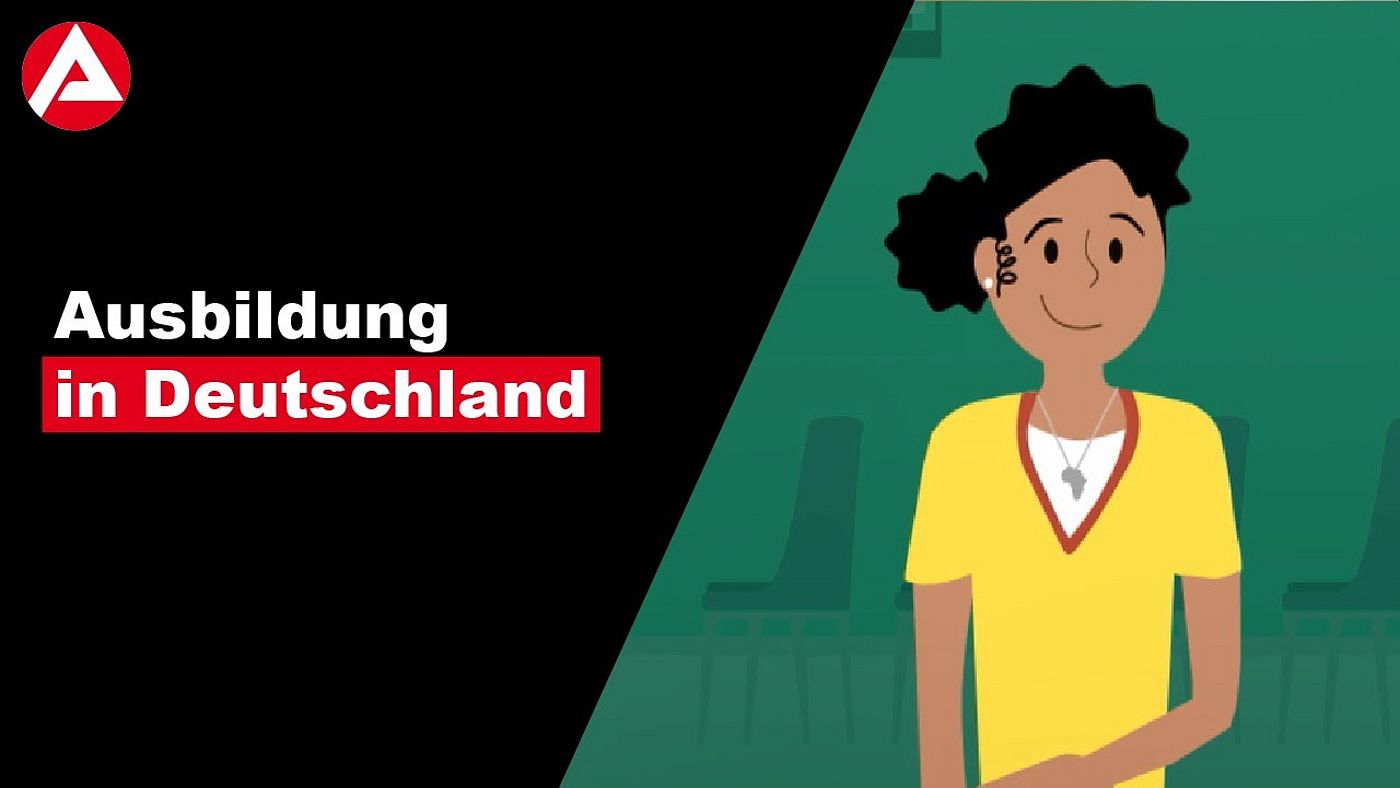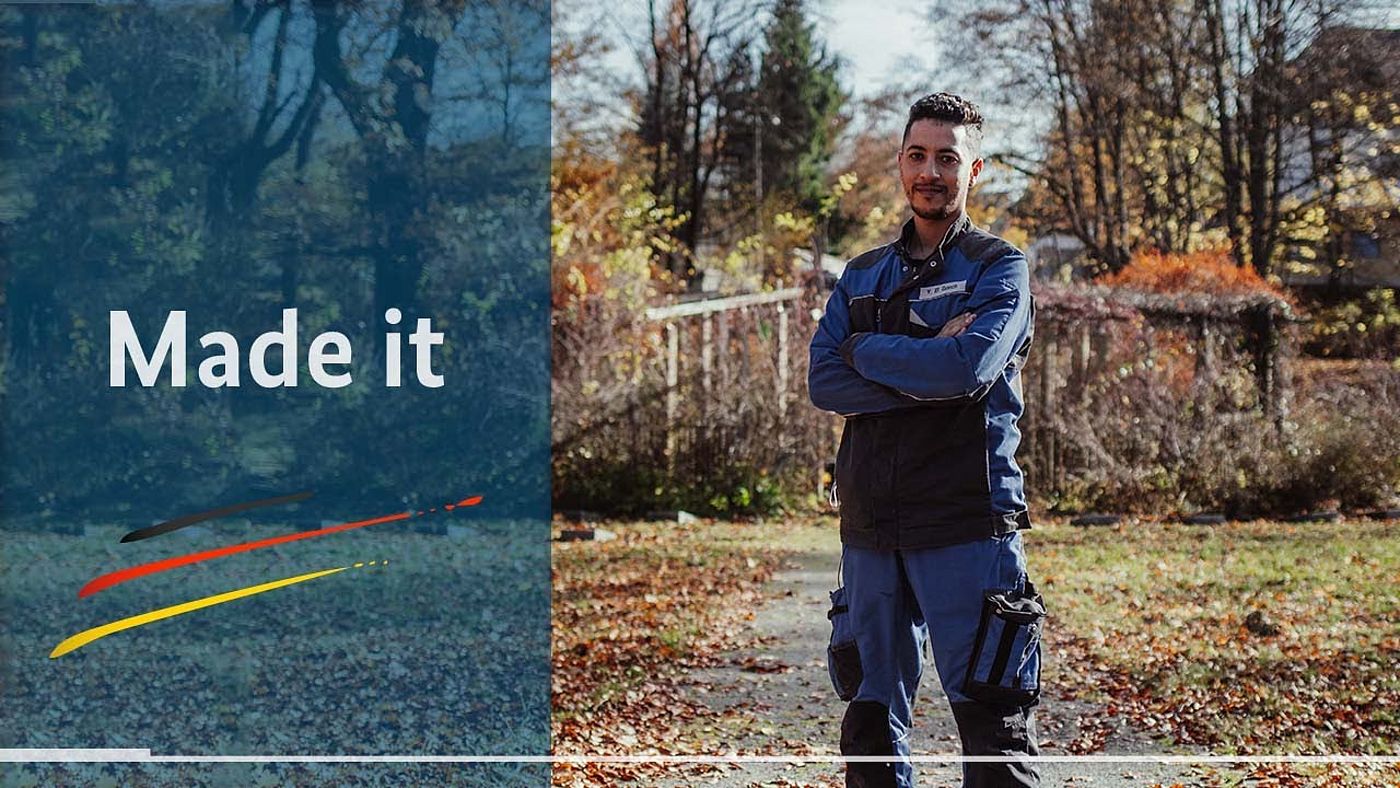
What is vocational training?
Are you interested in vocational training in Germany? Here you will receive basic information on the various types of vocational training in Germany.
Vocational training in Germany serves to acquire the necessary knowledge and skills for a certain profession and to complete it with a recognised professional qualification. There are various types of vocational training, such as school-based or dual vocational training and dual studies, for example. The right type of vocational training depends on the respective sector and the career plans of the individual.

Video: Vocational training in Germany
Dual vocational training in Germany
Vocational training in Germany offers excellent opportunities for the future:
- High career prospects – companies are urgently looking for well-trained skilled workers.
- Valuable practical experience – thanks to the dual system, apprentices learn directly in the company.
- Secure prospects of permanent employment – many people who completed their vocational training successfully are subsequently employed permanently by their training company. An opportunity for motivated young talents!
Dual vocational training is therefore a special type of training to learn one’s profession in Germany. During dual vocational training, you also get comprehensive practical training in a company, aside from receiving theoretical knowledge. In general, this type of vocational training takes two to three years to complete, with alternating theoretical and practical periods. This means: every week, you spend one or two days in vocational school, and on the remaining days, you are in a company. You can therefore apply the theoretical knowledge in the company immediately, for example, by participating when working on a machine. If you are interested in dual vocational training, but you are not quite sure of which sector to choose, please refer to the “vocational training professions in demand” where you will find the most important information on the different professions.
How does dual vocational training work?
Usually, dual vocational training starts on the 1st of August or the 1st of September each year. During vocational training, you also go to vocational school, in addition to practical work in the company. That is where you will study German, English and Social Sciences. Besides that, two thirds of the lessons are made up of subject-related topics which are especially relevant for the profession you are trained in. You are entitled to at least 24 working days or four weeks of paid leave per year during your vocational training; however, paid leave can only be taken during school holidays.
After the first half of your vocational training, you must pass an intermediate examination to show what you have learnt in school and how you apply that knowledge in the company. The vocational training ends with a final examination. To be admitted to the examination, you must be able to provide a report portfolio . A report portfolio documents the course of your vocational training in terms of content and the acquired knowledge and skills. This guarantees that the content of the vocational training was mediated according to the framework curriculum. As a rule, the examinations are in German. If you pass successfully, you have a good chance of a career in the German economy.
How much do you earn during dual vocational training?
During dual vocational training, you receive a monthly salary from the company where you work. Trainees in Germany currently earn at least 682 euros gross per month in the first year of training (valid for the year 2025). Depending on the occupation, you can even earn up to 1,200 euros gross in the first year. The salary increases with each year of training. By the third year, trainees earn at least 921 euros to 955 euros gross per month. Keep in mind that a portion of your training salary is deducted for social security contributions. If you earn more than 11,604 euros per year, you will also need to pay taxes. For detailed information on collectively agreed training salaries, you can refer to the table from the Federal Institute for Vocational Education and Training .
How is the dual vocational training organised?
Vocational school
In dual vocational training, various parties play a role. In vocational school, you are taught different subjects in a school by teachers. In the company, you are trained practically by your training supervisors. That is where you learn to put your acquired knowledge to practise. You are also accompanied by a training mentor. That is your contact person for all matters concerning the vocational training.
The tasks of the chambers
Depending on the vocational training profession and region, there is a responsible body for your vocational training, the so-called chamber. The chamber supervises the vocational training as a neutral mediator between the apprentice and the company. For example, it verifies whether the vocational training contracts are aligned with the legal requirements regarding the salary and (paid) leave. The chamber also serves as a point of contact for apprentices who come into conflict within their company. In addition, the apprentices take their intermediate and final examination at the chamber. After passing the final examination successfully, the responsible chamber awards them the qualification certificate. Programmes of technical or commercial vocational training are supervised by the Chambers of Industry and Commerce, and the vocational training programmes of the crafts and trades are supervised by the Chambers of Crafts.
The training regulation
Legal regulations concerning your vocational training are written down in the training regulation. It contains the exact title and description of the profession, as well as the framework curriculum. By means of this curriculum, the skills and knowledge to be acquired, as well as the time required, are stipulated in a binding manner. On this basis, the examination requirements are defined. When designing their in-company vocational training framework, the companies are obliged to take the training regulation as a guideline.
On the website of the German Office for International Cooperation in Vocational Education and Training , you will find comprehensive information in numerous languages, as well as an overview of the professional vocational and further training in Germany.

Video: From Morocco to Germany for Vocational Training
School-based vocational training
There are professions that are only taught in vocational schools, called either Berufschule or Berufskolleg. This means that there is no alternation between time spent in vocational school and the company; instead, it is a type of vocational training with full-time schooling. You gain practical experience during concurrent internships. Professions in the sectors of social work, healthcare and nursing, education and teaching are mainly taught in vocational schools. You can find a list of all school-based vocations training programmes on the “Planet Beruf ” website.
Additionally, there is an option to acquire the entrance qualification for a university of applied sciences (Fachhochschulreife) or a subject-related university entrance qualification (fachgebundene Hochschulreife). All of these qualifications offer opportunities for further education after vocational training. School-based vocational training usually takes one to three years to complete.
How does school-based vocational training work?
During school-based vocational training, you mainly spend time at vocational school either a Berufsfachschule or a Berufskolleg. You have class from Monday to Friday according to a fixed curriculum. Depending on the training profession, practical periods are either at the end of the school year or at the end of the vocational training programme. Just like dual vocational training, school-based vocational training is supervised by a responsible chamber. This chamber is where you will take your final examination at the end of your vocational training. The application for school-based vocational training must usually also be submitted up to a year in advance. Please make sure to start preparing in due time.
To learn what requirements apply to school-based vocational training, please visit the “Requirements for vocational training” subpage.
Do you earn money during school-based vocational training?
Unlike dual vocational training, you do not receive a fixed salary during school-based vocational training. These programs are offered at public and private vocational schools. Training at public vocational schools or colleges is free of charge. However, at private institutions, you often have to pay tuition fees. An exception is the healthcare sector, where trainees complete extended practical phases in hospitals or nursing homes and receive compensation throughout the entire training. For example, as a healthcare and nursing professional, you earn 1,341 euros gross per month in the first year of training and 1,503 euros gross in the final year.
Dual studies in Germany
Dual studies combine practical experience in a company and studying at a university. The advantage of dual studies is the acquisition of two qualifications after completion: one from the university and one from the company. This type of studying is especially offered in the commercial and technical sectors, for example, in Economics, Mechanical Engineering or Computer Science. Dual studies are designed differently, depending on the study and time model; the model depends on the agreement concluded between the company and the university.
Dual studies are less scientific than regular studies at a university. In addition to the theory mediated at university or a university of cooperative education (Berufsakademie), the students get to know the day-to-day practice at a company via vocational training. The high level of practical experience opens up excellent opportunities on the labour market and for one’s career. Moreover, you are remunerated during the time you spend in the company, just like other apprentices.
Note: tuition fees!
As a rule, dual study programmes are offered at private universities. Please consider that you have to pay monthly study fees. The company may agree to pay the fees. Make sure to touch on this matter during the job interview.
Dual studies generally take three to five years to complete. To be admitted to this type of studies, you require the entrance qualification for German universities. To receive a place for dual studies, you first submit an application to a company which offers this special type of vocational training. After that, you enrol at the university cooperating with the company.
You can find a list of dual study programmes and training companies at “Ausbildung Plus ”. Via the job search of the Federal Employment Agency , you will find companies offering dual studies. Simply use the options for filtering the results to set your desired time to start and your desired sector.




